- Home
- insider picks
- news
- How a Ford dealership saved me from a charging disaster my first time driving a Tesla Cybertruck
How a Ford dealership saved me from a charging disaster my first time driving a Tesla Cybertruck
Graham Rapier

- Tesla EVs come with an adapter to charge at non-Tesla chargers.
- But that adapter doesn't work with the Cybertruck, Tesla says.
When I got behind the wheel of my 3-day rental earlier this month, I knew driving the Tesla Cybertruck would be unlike any other driving experience.
What I didn't expect was for the attention-grabbing truck to also give me a headache when I tried to juice up. After all, it's Tesla's newest product, the company's superchargers are seemingly everywhere, and EV charging is slowly improving across the board.
Boy, was I wrong.
In all of my naivety (despite editing articles every single week about electric cars and their associated infrastructure challenges), I thought the reporting trip would be a breeze. I would pick up the vehicle, test it out, charge it overnight, stop quickly at a Supercharger on the way to return it, and be on my way.
Not so fast.
Here's where my assumptions went astray, thanks to some design oversight from Tesla and a lack of contingency planning on my part:
I picked up a shiny new Cybertruck, one of the first few hundred made, in a Target parking lot in South Austin.
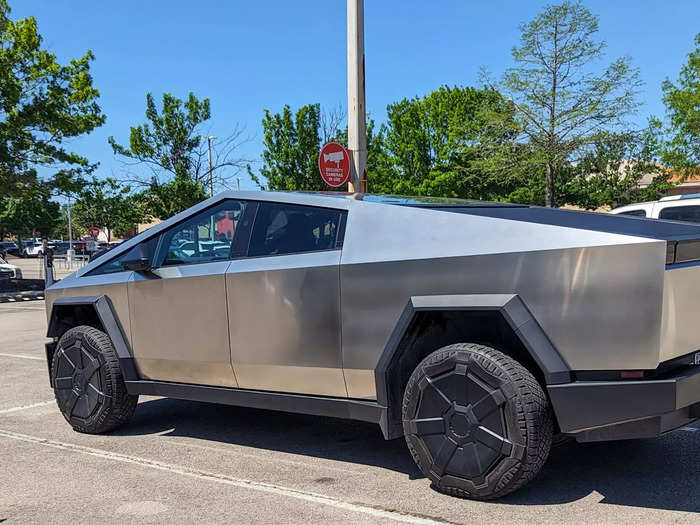
It was my first time using Turo, the peer-to-peer car rental app (more on that in a later story), and the pick-up was seamless.
I was staying at my parent's house in the Texas Hill Country, about an 80-mile drive, so I knew I would be fine on range for the first leg of this journey. I also made sure to research Superchargers — there wasn't one in my parent's town — but there were two within 30 miles, and some new third-party plugs in town I hoped to check out.
Given the truck's advertised 320-plus miles of estimated range, I didn't give charging much more thought.
As I settled in and came to terms with the contraption I was now responsible for operating, I made a mental note of the estimated range remaining: 218 miles
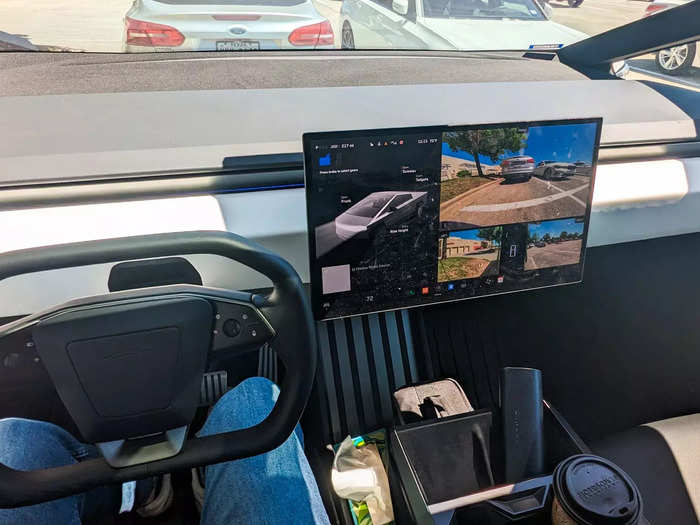
The truck's owner, whom I never actually met face-to-face, had a charging limit set at 80% to protect the battery pack's long-term health.
I also noticed the massive front windshield and sunroof actively soaking up the Texas sun, which would definitely affect the range if I cranked the climate control to cool off. Still, even with the AC blasting and some fun accelerating to investigate the truck's handling, I knew I would be fine mileage-wise.
The truck handled winding Texas backroads with ease, hugging corners and accelerating astonishingly quickly.
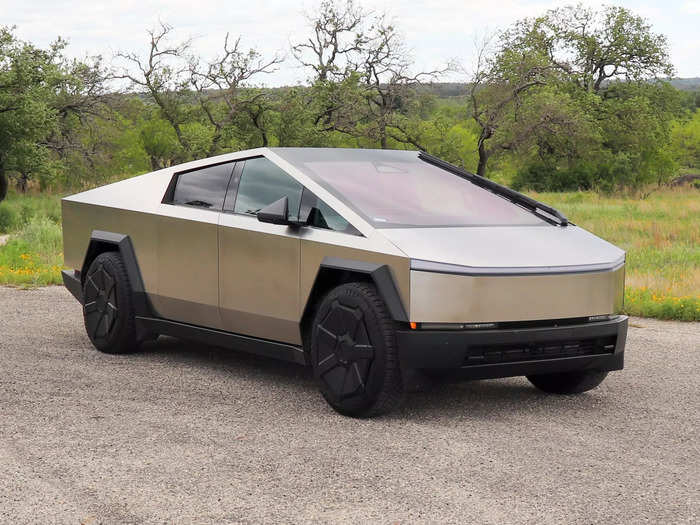
My excitement to test out "sport mode" and the truck's speed probably didn't help my range either.
I arrived in the heart of the Hill Country with 111 miles remaining, according to Tesla's onboard computer, plenty for another full day of testing every feature possible. Charging would be no issue, I thought, and I wanted to get the full experience.
Some more testing and photo-taking took my range to about 85 miles when I locked up the truck for the night.
To my surprise, I lost about 20 miles of range overnight. This meant starting the next day with 62 miles in the tank.
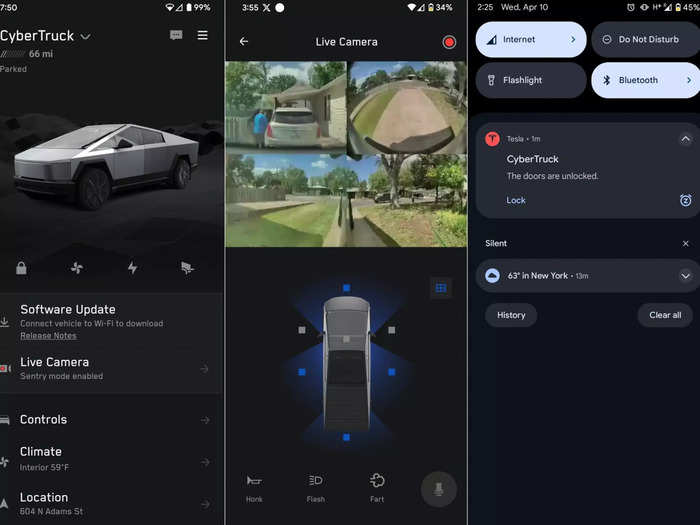
I later learned Tesla's sentry mode can eat battery life as it monitors the exterior cameras. That's when some of my anxiety began to set in. "I really hope this one public charger in town works," I thought as I prepared for a day of testing the truck. I headed over to the public charger first thing to check it out.
If it were my own truck, I would likely have a high-voltage outlet at home to charge overnight and start every day with a (mostly) full battery. But because it's a rental and my parents don't have an EV, that wasn't an option.
Unfortunately, the public charger was occupied. Time to get creative.
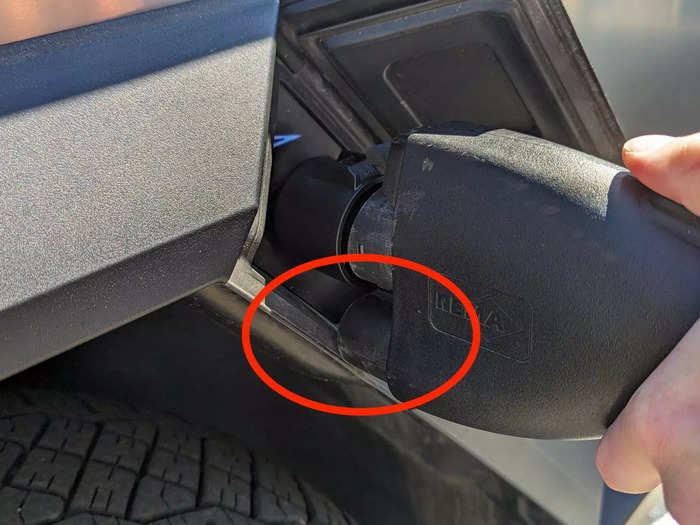
I opened PlugShare, a crowdsourced app that aggregates all EV chargers onto one map, and headed over to the local HEB.
The best US grocery chain (depending on who you ask) has installed chargers at many of its locations around Texas. The ones here were brand new from Volta. (So new they weren't yet showing on Volta's app or even Google Maps Street View).
HEB didn't respond to questions about how many chargers it has installed so far or of which brands.
This is where the problems started. I (wrongly) assumed Tesla's adapter would work for all CCS chargers. CCS is an industry standard that predates Tesla. But newer, second-generation CCS chargers have additional DC fast-charging pins that make the plug bulkier on the bottom to increase charging speeds.
Even with the adapter, the bottom part of the plug could not fit past the Cybertruck's plastic fender.
Before you send me hate mail, there’s an important nuance here: Tesla does, in fact, sell a CCS combo adapter for $250. It doesn't work with the Cybetruck.
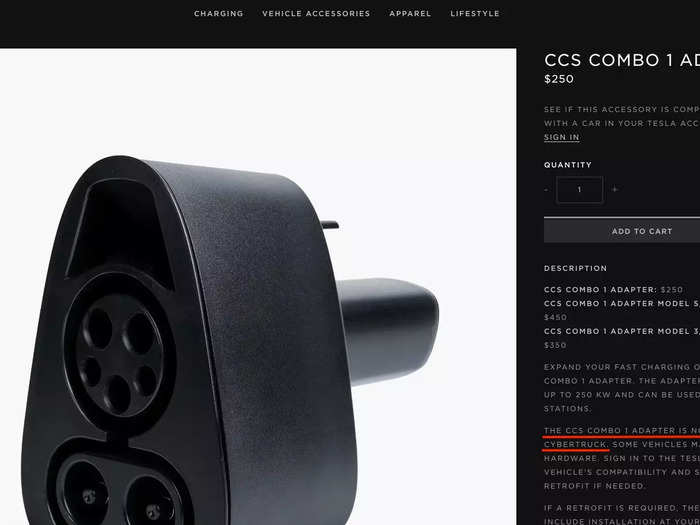
So I was stuck with a measly "SAE J1772" charging adapter that comes with every Tesla. Silly me.
This is when panic began to set in. What if the car using the public charger in town was there all day? It could be hours, given how slow those are.
But deep down in my journalistic notebook of a brain, I remembered that Ford was installing EV chargers at many of its dealerships. The one in town showed up on PlugShare, and maybe, just maybe, that one would work differently or have different adapters, I thought.
I called them before heading over just to make sure the charger was working and available to anyone. They said come on over. I didn't tell them exactly what I was driving yet.
There's one thing you should know about pulling a Cybertruck into a Ford dealership in Texas. You're going to get lots of attention.
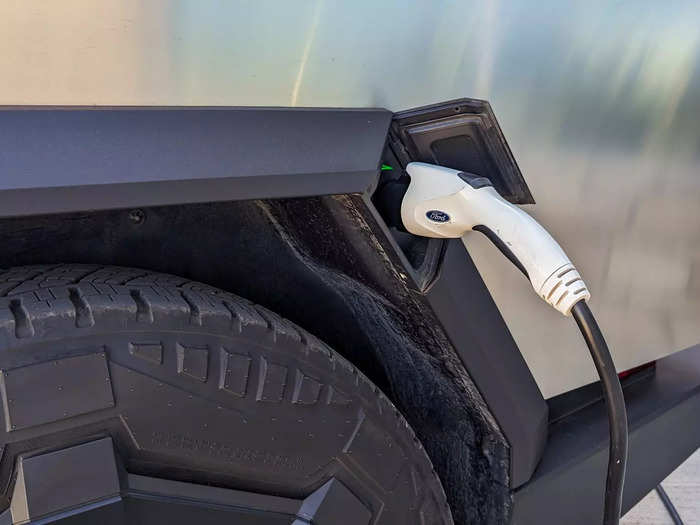
Their brand-new CCS fast chargers wouldn't work with the Cybertruck, either, thanks to the larger plug on this new generation.
As more automakers switch to Tesla's charging technology, now known as the North American Charging System or NACS, the adapter issue is only going to get worse. For now, the two standards largely operate at the same speed, with the plug shape being their main difference.
Luckily, the dealership had an old-school level-2 charger around back. They were happy to let me hang out for a bit if they could have a look at the truck. I was happy to oblige.
Charging on a car lot with no shade or amenities isn't fun, but it's better than being stuck.
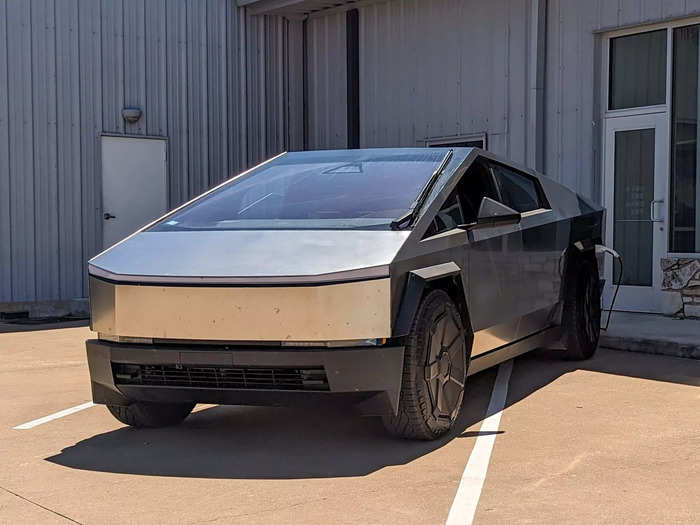
"My new Bronco used to be what turned heads in this lot," one employee told me. "I can't compete with this!"
After about an hour, I had added nearly 30 miles to the truck's estimated range and decided to go try the public charging spot in town again.
An open spot this time! Maybe I wouldn't be stranded after all.
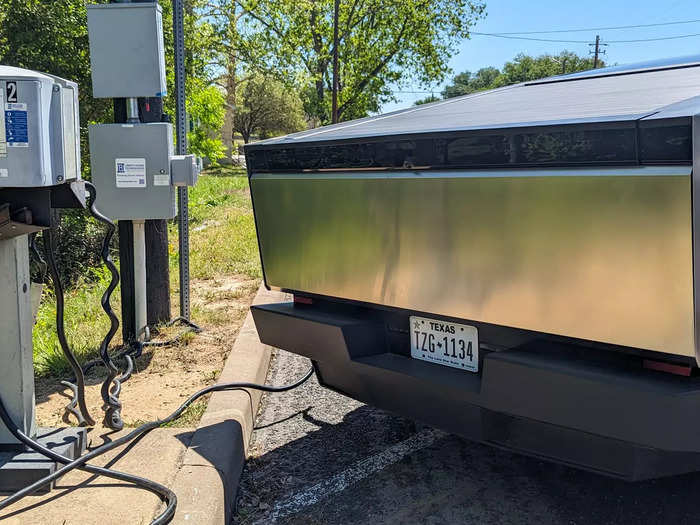
I didn't have high hopes after reading some reviews. And the station's appearance wasn't helping my anxiety. I pulled in and set to figuring it out.
I had never heard of LibertyHydra chargers, and their app was clunky at best. Still, I was able to pre-pay for charging increments up to 4 hours at a relatively cheap rate — $8.90 total in this case. (The company didn't respond to questions about uptime and maintenance on their system).
It worked! Once electrons started flowing I was getting about the same charging rate as at the dealership.
Some quick back-of-the-envelope math showed I could easily finish the day and make it to a Supercharger the next morning to return the truck with the same range as I picked it up.
Relief.
With (most) of my anxiety squared away, I set out to test another strange task asked of EV owners: Leaving a car for hours.
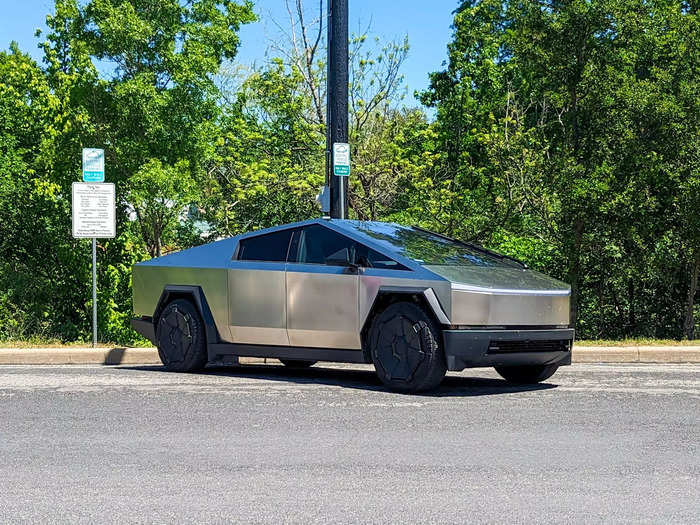
Luckily, nobody messed with the plug. (The app would have warned me if the truck stopped charging unexpectedly). But there were plenty of passersby still taking photos.
I was able to monitor the charging remotely on the app.
As the truck sat in the sun charging, temperatures inside climbed rapidly.
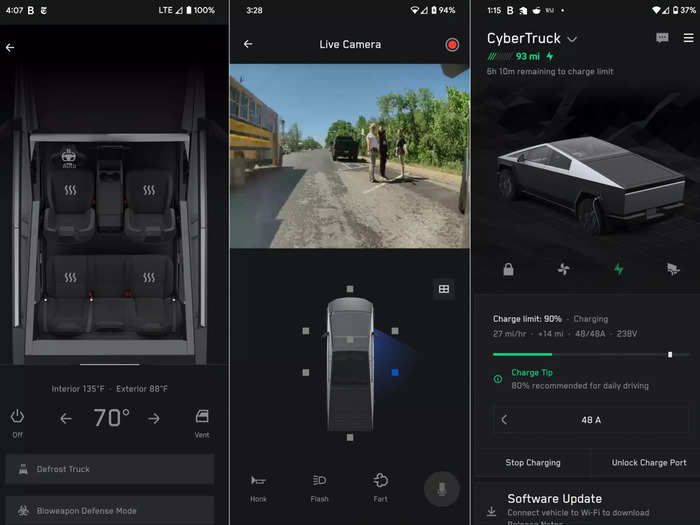
But the same way I could see this meant I could also start the AC on my walk over to pick it up, a handy feature for hot climates like Texas.
When all was said and done, I had 170 miles of charge for the next day's return trip to Austin with a stop at a Supercharger.
Tesla owners have told me for years that the Supercharger network was a huge selling point, and this trip proved that to be true.
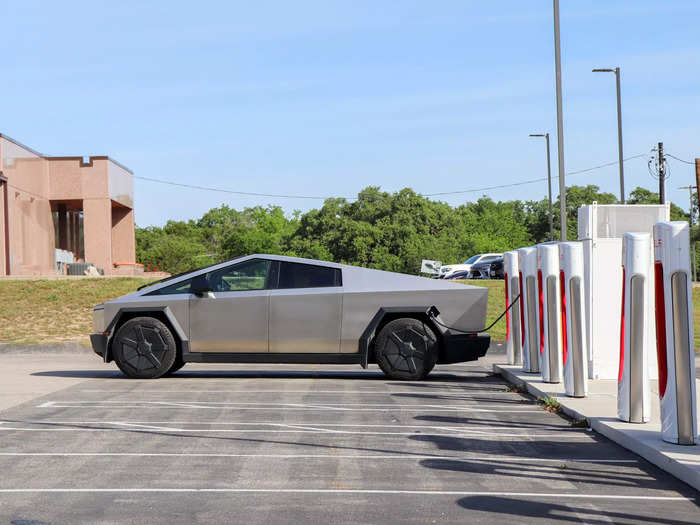
Supercharging takes away most, if not all, of the hassles I encountered. (Charging overnight at home would have as well.)
On the return trip, I simply plugged in a Supercharger along my route into the computer and headed down the road. About 15 minutes away from the charger, the truck notified me it was pre-conditioning the battery for a faster charge, which seemed to mean no more regenerative braking but no other major changes.
I arrived at an empty — albeit stark — Supercharger in Johnson City, Texas, and plugged in with no issue. The truck immediately began charging at warp speed compared to my other two tries, adding 140 miles of range every hour. I was topped up in exactly 27 minutes to the limit pre-set by the owner.
On a brief walk to the local ACE Hardware and a doughnut shop (no amenities at this charger), the truck let me know that charging was almost finished and warned me of idle fees if I remained plugged in more than 5 minutes after.
The total came out to $17, my Turo host told me. Since it was a rental, I didn't even have to think about it — and he didn't request a reimbursement.
I dropped off the truck with about 125 miles of range right next to a Supercharger.
Was I truly stranded at any point? Not quite, but it was as close as I ever wanted to be. On my next road trip in an EV, I'll double-check my adapters — and not count on random ones to get the job done.
Popular Right Now
Popular Keywords
Advertisement